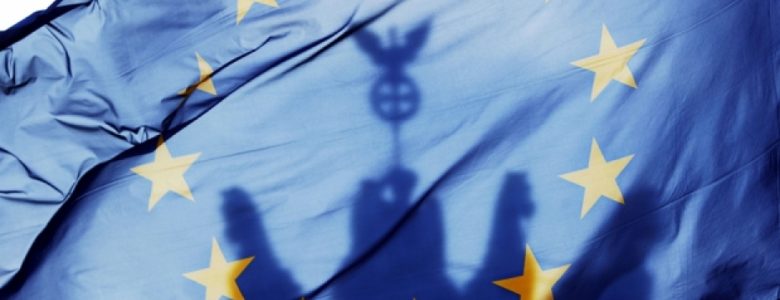
What now, Europe?
A common criticism of progressives is that as soon as things look up, left-leaning governments are back to their old “profligate” ways – as if the 2007 financial meltdown had been caused by redistributive economic policies.
Today, the same criticism can be thrown back at the European right-wing establishment: only yesterday, they were panicking with Brexit or Le Pen’s imminent election – a direct result of the European Council trying to build Europe behind the people’s back, without meaningful democratic controls. Today, they are back to their old “profligate” ways, ramming more ‘eurocratic’ reforms down people’s throats without fair democratic representation.
Nowhere can such a careless attitude be felt stronger than in Germany’s CDU, which seems set to win tomorrow’s elections. The secret of the CDU’s success is a dysfunctional European framework: one that disproportionally favors Germany both economically and politically, punishes weak countries for trying to run countercyclical economic policies, but does nothing to address Germany’s trade surplus. Such a distortion has allowed Germany to cross, unscathed, what has meant a lost decade to the rest of Europe. The German electorate is set to reward the CDU for keeping the status quo, oblivious to the damage it generates to the European project.
No country stands to lose more from a failed EU than Germany. It is time for German voters to realize that a vote for the CDU is a vote for false short-term rewards and a long-term disastrous breakup of the EU.
José Luis Malaquias is a DiEM25 member and a Physics engineer based in Portugal.

German elections, science and climate change
Last week’s Nature editorial praised chancellor Merkel for her “welcome immunity” against governments that seem to ignore basic science, deny climate change and go against the Paris climate agreement. The editorial ends by arguing that Merkel not only deserves another term, but also that she is able to deliver and promote science even further. Some pages later in the same issue, there is a more detailed journal article on “Germany’s scientific excellence”. This is another compliment for Merkel, although a bit more critical as it puts Germany’s science into historical perspective. Then, despite all the honors and praise in the previous pages, we find a commentary that is heavily critical on Germany’s climate and environmental policies in the last couple of decades.
At DiEM25, we welcome Nature’s effort to promote the scientific discussion and to elevate it to key political debates such as next Sunday’s German federal election. We also believe that climate change and green technologies are vital issues not only for the next chancellor or the EU, but worldwide. As Germany is likely to miss its environmental targets by a wide margin, we should envision the next German chancellor addressing all criticism on matters of climate change by accelerating Germany’s green transition and becoming a world leader in eliminating CO2 emissions.
Merkel has the potential to deliver, indeed. However, we need to speak out if German elections are to change anything.
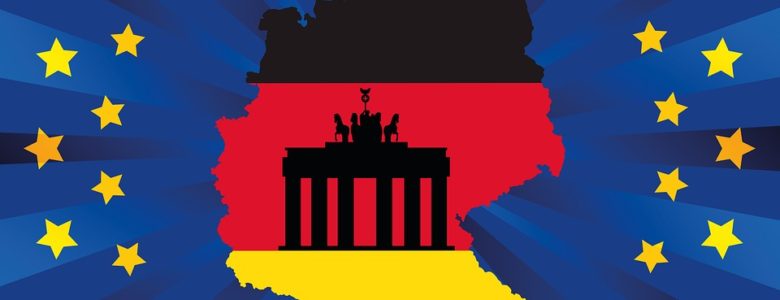
To lead Europe Germany needs to come to terms with its crucial role in it
National elections naturally concentrate on national issues. But Germany, whose role in Europe is absolutely pivotal, had a duty to itself vigorously to debate its role in, and proposals for, shaping Europe’s future. It is, thus, greatly disappointing that the federal election campaign now drawing to a close has been so parochial, so empty of any serious debate on Europe, on the eurozone, on all that Berlin needs to do to stabilise the political and economic environment in which Germans live and dream of a better future.
It is commonplace amongst Europeanists to admonish the provincialism of the political debate in Britain that not only yielded Brexit but also ensured a process of leaving the EU that is detrimental to the interests of the people of Britain, especially the young. But was the quality of the debate during this German election debate any better? Politicians clashed on radio and television, delivered speeches to their constituents, wrote articles in newspapers as if Europe was something ‘out there’ that did not really concern them.
German friends with their finger on German society’s pulse tell me that Mrs Merkel will be returned because they trust her to insulate them from the ‘bad stuff’ happening elsewhere in Europe. The feeling that “Germany is doing alright” under the Chancellor’s pragmatic project of maintaining the status quo is what will prevail on Election Day. However, this belief is predicated upon a dangerously false assumption: that Germany’s stability and prosperity can be reproduced within the European Union’s current dynamic, as long as Berlin manages to impose the ‘rules’ more strictly.
The greatest threat from this misconception is falling upon the youth of the country. Young Germans crave to be good citizens of Europe. They want to traverse European borders and feel that they are Italians in Italy, French in France, and even Greeks in Greece. This is a splendid sentiment which must be encouraged and honed. It is, indeed, in concert with the spirit of radical internationalism that our Democracy in Europe Movement, DiEM25, espouses. Alas, it is a sentiment that the current pre-election debates put in jeopardy by giving the politicians who will be in government soon the false signal that Germany can stay more or less as she is in a Europe that stays more or less as she is.
For several decades, Germany had the privilege of being free to allow itself to behave as Europe’s gleaming, efficient, quality-product producing workshop. And so it was, and remains. However, this privilege, this freedom, was underpinned by the fact that someone else was securing enough global demand for Europe’s quintessential workshop: the United States of America. Between the early 1950s and 2008, it was America’s freedom from deficit-phobia that created enough global demand for German, Dutch, Japanese and, later, Chinese factories to keep churning out their products and find buyers for them with enough money to pay above-cost prices.
It was during those times, when global demand was managed by America, that the German economic miracle took place and the European Union was made possible. We Europeans love to think of our Union as a European achievement. While we can be proud of it, the truth is that it was the Americans who provided the macro-economic environment in which the miracles of Europe and Germany could flourish. It was in that world that ordoliberalism made sense.
Alas, in 2008 the United States lost its capacity to keep stirring up enough demand for the net exports of the economies basing their economic model on large trade surpluses. Which means that Germany’s time honoured refusal to replace the United States, at least within Europe, as the manager-in-chief of aggregate demand will sooner or later destabilise the German economy. The roots of this discontent are already growing into forests of disgruntlement around Europe. Left unattended, their poisonous blossoms will prevent young Germans from fulfilling their dream of a pan-European citizenship.
This is why it is so very pressing that ordoliberalism, whose time has passed, must be abandoned and be replaced by a progressive, macroeconomically sensible, pan-European economic and social agenda. Casting an eye on the current political terrain, hours before the polls open, the only political forces that I see as being in tune with this are Die Linke, as personified by Katja Kipping, and elements of the Greens who have not yet been co-opted by the ordoliberal or pro-Diesel lobbies within that party.
Article originally published in freitag.de
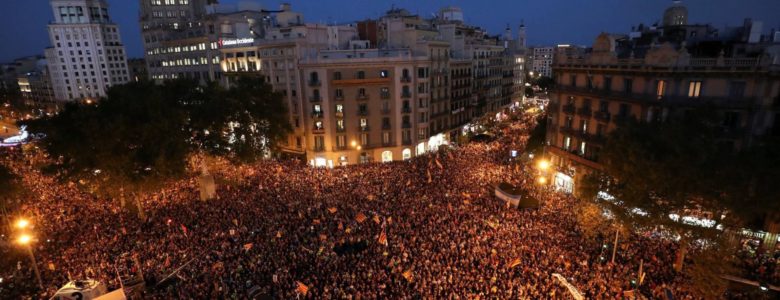
Varoufakis on the Catalonia Referendum: “I’m not taking sides”
Regarding the referendum on the independence of Catalonia and following the strategy of identifying everyone with one side or another, a recent interview with Yanis Varoufakis in a Spanish digital media outlet has caused the co-founder of DiEM25 to return to the public sphere and clarify out-of-context headlines.
“I am not taking sides on whether Catalonia should be independent or not” and “What we’re promoting in DiEM25 would solve the problem. We want a real European Union that becomes a single jurisdiction, a country if you want to call it that. In that scenario, it doesn’t matter if Catalonia is part of Spain!”
Either of these two phrases could have inspired the headline for the interview, but then the article would not have received the same media fuss. DiEM25 will always defend the two basic pillars of democracy: the principle of majority, expressed in elections and referendums; and the protection of civil liberties and individual rights.
Unlike Brexit, the referendum on the independence of Catalonia is not driven by xenophobic and anti-EU motives. It’s not the same thing. In this situation, we cannot oppose the idea of a referendum simply because the Constitution doesn’t allow it. In that case, we must work to change the constitution and make it not illegal, as stated in the 1945 UN Charter. Political problems must always be solved politically, by discussing and proposing solutions to all kinds of problems. Repression is never the solution.
At DiEM25 we’re working to create a European Union which is open, fair and shows solidarity, in which all kinds of ideas can be argued and defended.
Without getting carried away by the eye-catching headlines that the media use to attract attention and create controversy, we encourage all those interested in knowing Yanis Varoufakis’s position regarding the holding of the referendum in Catalonia and many other issues, to read the complete interview (in Spanish).
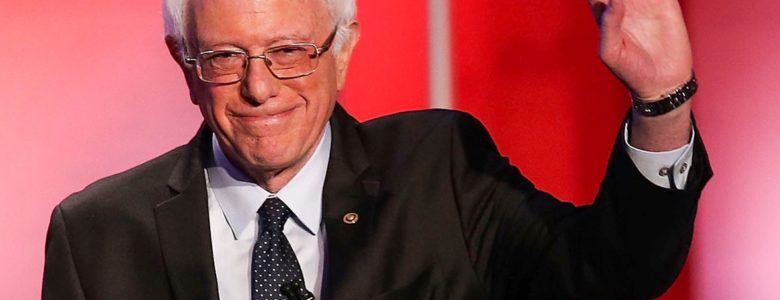
The Sanders phenomenon is still here
Yes, Bernie Sanders – who talked about free health care and education, provided some balance for those who felt US politics shifting to the right, and made the word “socialism” acceptable again – lost his party’s nomination back in the 2016 election.
But he is still one of America’s most popular political figures. And he is still fighting, recently introducing a bill to ensure health care access for all.
The bill has raised a lot of criticism, but also much hope. Even if it ultimately fades to another version of Obamacare, it will be a springboard for longmuch-needed left-oriented debates within the Democratic party and beyond, on vital issues.
DiEM25 thinks this is the right way forward. We support moves like Sanders’ new bill, as progressive proposals that put people first. The same kinds of proposals that we want to see implemented in Europe, as part of our European New Deal.

The Eurozone is ‘bouncing back’? Tell that to the people of Spain and Greece
EU citizens living under squeezed financial circumstances could be forgiven for wondering whether European Commission President Juncker was having a joke at their expense when he spoke recently about how Europe’s economy is finally bouncing back. After a tumultuous decade triggered by the global financial crisis in 2007, the Eurozone’s growth figures are being compared favourably to America’s, with production up 3.2% against last year.
However, evidence points to a wide chasm between people’s lived experiences and Juncker’s message of triumph. It is doubtful that the citizens of Spain and Greece, for example, would agree with his assessment.
According to the Commission, 30% of Spaniards are at risk of social exclusion due to poverty and income inequality. The proportion of children in Spain living below the poverty line increased by 9% between 2008 and 2014, to 30.5%, and Spain is in 7th place on the OECD list of countries where inequality has risen the most since 2010. Greece, meanwhile, is at top of this ranking.
Now, ‘growth’ may be used to express the success of a country’s economic performance. But how impressive is it really, when the Troika’s austerity-driven politics is causing so much human suffering in countries like Greece and Spain?
According to the OECD, countries have continued the trend towards implementing tax policy reforms to boost growth. French President Macron is proposing to cut corporation tax from 33.3% to 25% by 2022.
Yet the use of tax levers, primarily cuts to corporation tax, as a means to draw inward investment has been disputed by top economists.
“The way you get a productive economy is changing the fundamentals, says John Van Reenen of the LSE. “You get your people to be more skilled, or you have your infrastructure working efficiently. You’re never really going to get there just by reducing corporate tax.”
So what’s the alternative? It is possible to pursue a successful strategy without crucifying ordinary people in the process, and Portugal is leading the way. The country adopted left wing alternatives to austerity policies in 2015 and is now reporting an impressive recovery. It is a model from which governments can learn.
Fighting austerity is a core principle of DiEM25 as set out in our manifesto. We do not equate success with supposed ‘growth’ which is gained at the expense of human rights, human dignity and human aspiration. And we think that governments that fuel cruel inequality by implementing self-defeating austerity ought to be challenged vigorously.
Join us and let’s get started!
Jane is a member of our London DSC and blogs at www.ambitiousmamas.co.uk on feminism, politics and race. You can also follow her on Twitter.
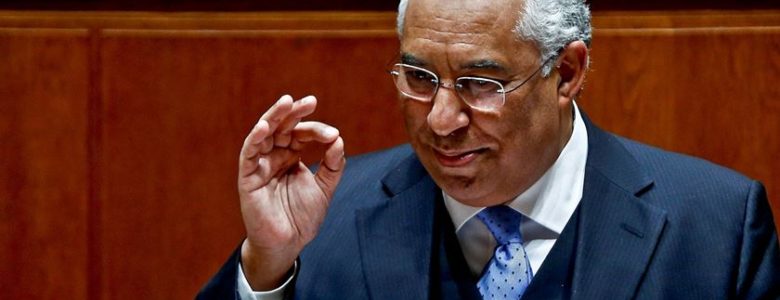
Portugal’s left-leaning economic recovery
Portugal has been getting noticed for its remarkable recovery in the last two years, defying the doomsayers who predicted the devil was coming the moment that the Troika-prescribed policies were reversed and an expansionary policy was adopted instead.
The left-wing government that came to power in 2015, ridiculed by the media as a “contraption”, reversed many of the cuts imposed by the previous austerity government, which had tried to go “beyond the Troika” with disastrous consequences. Under Troika policies the deficit limit was always exceeded, public debt rose from 90% to 120% of GDP, and unemployment went through the roof.
Oddly enough, this left-wing alternative, by reducing austerity, and returning income to the middle-class, managed to make the economy grow, increase the tax revenue, reduce the burden of unemployment benefits, and achieve the lowest deficit in the 43-year old democracy. Public debt is also decreasing for the first time in many years.
Was this an unexpected outcome? Not so, say most economists who had always claimed countercyclical policies were the way to fight an economic depression, and had dismissed the notion of “expansionary austerity” as absurd. It seems Keynes was right, after all.
Meanwhile, though, the structural flaws of the Eurozone, that contributed heavily to Portugal’s financial crisis, persist. For concrete proposals on how DiEM25 would resolve them, see our European New Deal.
José Luis Malaquias is a DiEM25 member and a Physics engineer based in Portugal.

Why universal basic income is not enough
As job hunting becomes harder throughout Europe and the world, it’s good to hear that US think tanks endorse the idea of a universal basic income (UBI). That is, money given to every citizen, so that all people can have opportunities to define their lives how they want. In other words, “free” money.
Will it make people lazier, or will it motivate them? The debate on UBI is intense, especially since it comes at a time of great technological advances. High-tech companies’ achievements consistently redefine labour markets. At the same time, many Silicon Valley companies and US think tanks want people to have a guaranteed income. It seems right, but also ironic.
At DiEM25, we agree with the logic of a universal basic income. Critically, however, we believe that the money should not come from additional taxes or the government. It shouldn’t be people paying themselves; nor companies paying for something extra.
We think the money should come from a dividend, financed from the returns on all capital; a “public” percentage of companies’ profits, especially for companies that commercialise technology developed from public funding.
How would this be managed? We propose a fully independent and transparent institution that would act as the reservoir, distributor and regulator of this dividend. An institution that truly represents people’s interests without relying on capitalism’s superficial interest in social justice.
Think this is a good idea? Or want to contribute to improving it? Join us at DiEM25 to help us formulate our ideas and fight for them!

German elections 2017: DiEM25's 8 proposals for Germany’s Progressives
Germany is pivotal. It is, and ought to be, a country central to the European project. But this project is in trouble because of a political failure to align the interests of most Germans with those of most other Europeans. Thus, Germany needs new narratives and policy agendas in order to energise a new politics across Europe – a politics which will reflect the common interest of the majority of Europeans.
But who will spread these new narratives and policy agendas? So far, the campaign for the upcoming German elections has not been encouraging in that regard.
So ahead of the 2017 German federal elections next September 24, DiEM25 acknowledges the issues at stake and has taken action.
Here’s how:
We tabled a proposal for DiEM25’s German Provisional National Committee to circulate among German DSCs. They discussed the document, whenever possible took it to public gatherings, amended it, and most critically, reached out to like-minded Bundestag candidates to endorse and commit to enact if elected. This, in the same spirit our French members approached their parliamentary elections last June.
Our German activists have moved fast and are in the process of confirming a list of candidates willing to adopt DiEM25’s proposed policy agenda for Germany. We will publish the list here ahead of the elections.
Below you can read our original proposal, “8 proposals for Germany’s Progressives.”
8 proposals for Germany’s Progressives
Introduction
Germany is pivotal. It is, and ought to be, a country central to the European project. But this project is in trouble because of a political failure to align the interests of most Germans with those of most other Europeans. All sentences beginning with “the Germans…”, whether they contain positive or negative evaluations, are misleading, generalising, and end up undermining the common interest of a majority of Europeans and progressive politics in general.
We created DiEM25 to provide new narratives and policy agendas that energise a new politics across Europe, which makes visible and gives voice to the common interest of the majority of Europeans. This is why Germany is central to DiEM25’s politics (it was not by accident that DiEM25 was inaugurated in Berlin!).
For progressive candidates in the upcoming federal elections in September, DiEM25 has the following eight proposals.
- On Germany’s social market model
Germany rose to envy-of-the-world status thanks to a social contract that offered the working class strong protection (and seats on the boards of directors of large companies) for its conformation to a flexible rule-bound, free-market environment in which business could get on with it. In conjunction with local banks linked to differently sized industries, and in a positive global environment, the so-called “German economic miracle” unfolded.
However, since the creation of the euro and the banking crisis it caused, German economic competitiveness has increasingly been bought at the expense of Germany’s social market model. The casualisation of many workers, the repression of wages, the doubling of the proportion of ‘working poor’ Germans, the Christian Democrats’ increasingly confident attempt to limit social spending and public investment – all these developments are quietly turning Germany’s social market model into an empty shell that only resembles what German social democrats had once thought they had achieved. Moreover, more ‘structural reforms’ that will further reduce the life prospects of millions of Germans are currently being tried and tested elsewhere in the Eurozone.
We call on progressive candidates in the German elections to:
Explain to the people of Germany that the (limited) achievements of the German model are under serious threat and that, moreover, the developments in the rest of the eurozone are enabling the dismantling of the German social market tradition. Defending and making necessary improvements to Germany’s social democratic institutions and model goes hand in hand with opposing the coalition’s policies in the Eurozone.
- On the Euro
Progressive German candidates are already ringing alarm bells across the Federal Republic, to warn voters of a gross and dangerous falsehood: the notion that Germany is doing well out of the euro crisis and that its leaders have shepherded the European flocks well and wisely during it. The reason is simply: Precisely the opposite has been the case. Germany is much weaker as a result of the crisis and Europe is at an advanced stage of disintegration as a result of how the German government has mis-managed Europe’s social economy and its resources.
Yes, it is true that the crisis has created a large surplus for the federal budget (due to the massive suppression of interest rates charged to roll over Germany’s debt) and a huge influx of capital into the Frankfurt banks (due to capital flight from weaker economies whose citizens fear Grexit, Italexit etc.) But these surpluses are a sign of weakness, not strength. They are the sign of massive current and future hardship of a majority of Germans. To have the German establishment celebrate them as indicators of economic health is to add insult to injury.
When a country like Germany reports its lowest level of investment (as a percentage of national income) at a time when investors are paying its government to borrow and savings are at the highest level in the nation’s history… When that country’s elites insist that the various surpluses must be maintained through further wage repression of the squeezed German working class, as a means to undermine the French and Italian working classes and give an excuse to the French and the Italian governments to squeeze their own workers… When in a country like Germany everyone is a saver (governments, families and companies save more than they spend/invest), thus being forced to entrust their hard-earned savings to other countries that they must then control via austerity and threats… When an aging country that feels a need to save for its future is creating the economic forces pushing interest rates below zero, thus depleting its own savings… When all this happens, you know that the country in question is in trouble.
We call on progressive candidates in the German elections to:
Make German voters aware of one basic thing: We are all in this together! No country is ring-fenced from the crisis. Germany cannot hide behind its surpluses without crushing its workers and its pension funds. If our monetary union is in the clasp of vicious imbalances, misery is shared between the weaker citizens everywhere – whether they live in surplus or in deficit countries.
- On a European New Deal
It is because we are all in this together, because there can be no solution for Italy’s or Greece’s problems that does not include an end to German mini-jobs, ‘uberisation’, underinvestment, etc., that Germany needs a European New Deal.
Now, a majority of Germans have been convinced that a European New Deal means Germany paying for the rest of Europe. They are right to think that Germany is rich but not that rich. However, they are wrong to believe that a European New Deal means German taxpayers paying more to fund the social welfare, investment projects and banking systems of the rest of Europe. To demonstrate this, and the way forward, DiEM25 has put together its European New Deal Policy Paper.
We call on progressive candidates in the German elections to:
Initiate a large social, political and cultural debate around the idea of a European New Deal, and use our European New Deal Policy Paper as a framework for this transformation.
- On European democracy
Most Germans want to be embedded in a democratic Europe. But at the same time, most German citizens fear that the price their country is being asked to pay for a democratic EU is one that Germany, however rich it may be, cannot afford.
DiEM25’s European New Deal argues that this is not the case! Indeed, the price a majority of Germans are today paying for the lack of a functioning democracy at EU level is large, and wasted. To move beyond the politics of fear and despair in line with our European New Deal, German progressives should also discuss the idea of a constituent assembly process envisaged by DiEM25’s Manifesto that can open a broad social, political and cultural process towards a proper democratic European Constitution.
We call on progressive candidates in the German elections to:
Start a debate on the idea of a European constituent assembly process and of a Democratic European Constitution.
- On the Green Transition
German governments and industry have made great strides in producing and sponsoring renewables, recycling and Green practices. However, the key to the Green Transition that Europe and the planet needs is massive investment. And massive investment in the green technologies and processes of the future is impossible outside the macro-financial framework of a European New Deal agenda as outlined by DiEM25.
We call on progressive candidates in the German elections to:
Deepen and expand their commitment to the politics of a democratic social-ecological transformation by putting forward an agenda that combines austerity cancellation, financial sector regulation and green investment-led recovery, and which therefore could serve as a framework for this transformation.
- On technological sovereignty
German industry prides itself on its technological progress. Nonetheless, when it comes to digital technologies, despite German industry’s expertise, Germany’s companies, society and government relies on Silicon Valley’s platforms in a manner that is harmful to technological sovereignty.
We call on progressive candidates in the German elections to:
Demonstrate to voters that Europe’s technological future cannot be left to German and American multinationals. Our economies and, indeed, our democracies depend on developing open source platforms that enhance our productivity and capacity to work together, without being exploited by the world’s latest form of monopoly power.
- On refugees and migration
Merkel’s initial positive reaction to the influx of Syrian refugees in the summer of 2015 has been vilified and classified as a spontaneous error. Her capitulation to ‘realpolitik’, and her despicable subsequent treaty with the Turkish President, has completed a nationalist and racist turn across Germany’s establishment.
But civil society is resisting. Its resistance must be celebrated and reinforced!
We call on progressive candidates in the German elections to:
Take Merkel to task for having betrayed her own initial instinct to “let them in”. Put forward tangible policies that are true to the spirit of “let them in” and which spread across Europe a sensible, humanist and realistic approach – not only to refugees but also economic migrants. Aim to stop the EU-Turkey refugee deal.
- On maintaining peace
Merkel, after a recent meeting with President Trump, announced that Europe must take its fate in its hands and no longer “rely on the kindness of strangers” for its defence. This is correct. However, progressives should beware: We do not need a European substitute of NATO. We do not want a European pact spreading belligerence and weapons near and far. We do not want another shameful European intervention like in Libya in 2011. We do not want a European threat that gives Putin more excuses to clamp down on Russian democrats.
We call on progressive candidates in the German elections to:
Demand blocking the sale of weapons to repressive regimes, as many progressives already do. With worldwide arms sales up 7 per cent to €4.03 billion in the first half of 2016, Germany is responsible for conflicts around the world. With arms sales to Turkey, Saudi Arabia, the United Arab Emirates, Algeria and others, Germany is directly supporting repressive regimes and wars, which subsequently lead to migration and refugee crises.
Fight for an Internationalist Europe that treats non-Europeans as ends-in-themselves. A Peaceful Europe committed to all efforts to de-escalate tensions in its East and in the Mediterranean, acting as a bulwark against the sirens of militarism and expansionism and proving its commitment by blocking the sale of weapons. An Open Europe that is alive to ideas, people and inspiration from all over the world, recognising fences and borders as signs of weakness spreading insecurity in the name of security. A Europe that finally acknowledges its responsibility for the historical crimes of colonialism and imperialism. A Liberated Europe where privilege, prejudice, deprivation and the threat of violence wither, allowing Europeans to be born into fewer stereotypical roles, to enjoy even chances to develop their potential, and to be free to choose more of their partners in life, work and society.